
Vaginal itching (in the intimate area) - Causes & Treatment Methods
Itching on the body causes discomfort, but when they appear in the intimate area, the sensation is even more unpleasant. The worst thing about vaginal itching is not knowing what's causing it. It's not always something to worry about, but infections and sexually transmitted diseases are among the causes.
In medical language, this itching sensation is called pruritus.
Itching in the genital area usually occurs when the balance between good and bad bacteria in the vagina disappears, and a visit to the doctor is mandatory. Today we understand together why they appear, how to treat them and how to prevent vaginal itching.
What is vaginal itching?
Itching in the intimate area in women represents discomfort in the vagina area. The sensation may be limited to the skin in the groin or pubic area and affect the inner, outer labia or the inside of the vagina. Other symptoms can be added to this discomfort.
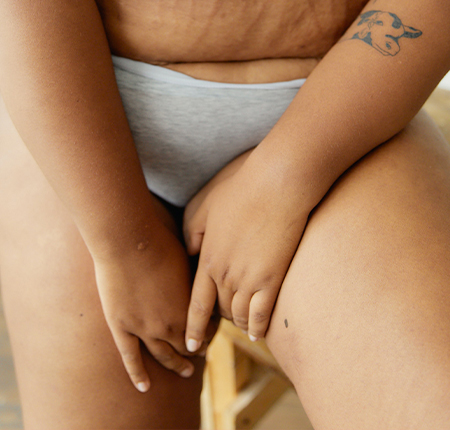
Causes - Why do I have itching in the intimate area?
However, the question "Why me?" appears, and the answer is not a short one. There are many causes that lead to the appearance of itching in the intimate area, and not all of them are related to a bacterial infection.
Irritations from epilation
Discomfort in the intimate area can be caused by waxing and should not worry us. In this case, it is something temporary that passes on its own within only a few hours.
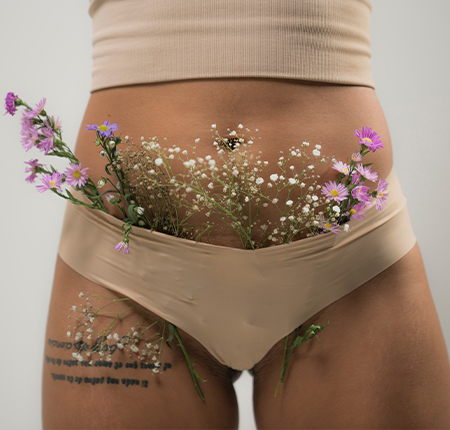
Hormonal changes
Hormonal changes, such as a drop in estrogen levels, can cause the lining of the vagina to thin, which causes itching. If you've already experienced menopause or if you're experiencing perimenopausal symptoms, itchiness is even more likely to occur.
The same thing happens during pregnancy and breastfeeding. We even have an article here where we talk more about the changes your body experiences during pregnancy.
Itching from genital herpes
Caused by the herpes simplex virus, genital herpes manifests as painful, itchy, fluid-filled blisters on the skin. This virus belongs to the category of sexually transmitted diseases, remains in the body throughout life and manifests itself especially during periods of intense stress and when the immune system is malfunctioning.
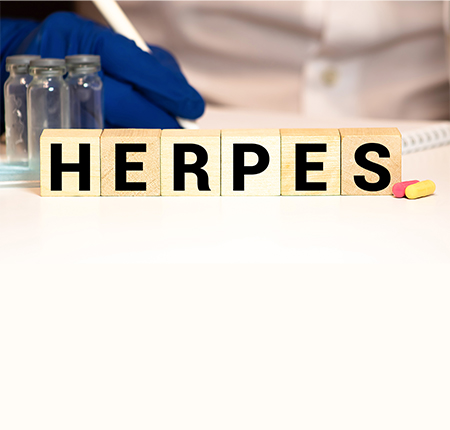
We are talking about the treatment and prevention of genital herpes right here.
Vaginal itching from Trichomoniasis
Trichomoniasis is another sexually transmitted disease that causes redness and itching in the intimate area, greenish or yellowish vaginal discharge, pain when urinating or during sex, and bleeding after intercourse. This disease most frequently affects women "past their prime".
Vaginal itching from candidiasis
Candidiasis is a fungal infection caused by a yeast called Candida, which normally lives on the skin and inside the body, but in normal situations it does not cause discomfort. If environmental conditions undergo changes, hormonal for example, Candida can multiply, causing infections that cause vaginal itching or pain, discomfort when urinating, pain during intercourse, and abnormal vaginal discharge.
All women can be affected by Candida at least once in their lives and we are here to help you with all the information you need to know. Symptoms, prevention and treatment for Candidiasis, you can find them all here.
To prevent and reduce the symptoms of Candida infection, Enroush has created an intimate gel specially formulated by gynecologists and dermatologists with 95% natural ingredients. It prevents irritation, itching, dryness and Candida infections - being 87% effective in protecting against Candida Albicans infections, with Tribulus Terrestris extract.
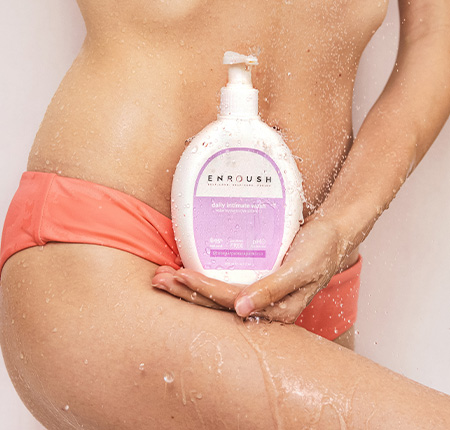
Discomfort from bacterial vaginosis
Bacterial vaginosis is one of the most common vaginal infections in women between the ages of 15 and 45. Bacteria naturally exist in the vagina, but if they multiply uncontrollably, they lead to bacterial vaginosis. The problem is especially prevalent among sexually active people. Symptoms include itching in the intimate area, burning sensation and pain, white or gray vaginal discharge, burning sensation when urinating, a strong, unpleasant odor of the genital area especially after sexual contact.
Itching from vaginal dryness
Vaginal dryness can lead to internal and external itching. In general, hormonal changes during menopause, prolonged showering and some medications can dry out the vagina.
Vaginal itching from irritating substances
Certain chemicals can irritate the vulva and cause itching in the intimate area. This could be a lubricant or spermicide, latex condoms (avoid them if you know you have a latex allergy), a soap (intimate or not), laundry detergent or conditioner. If there are no other symptoms besides itching, it is very likely an intimate care product.
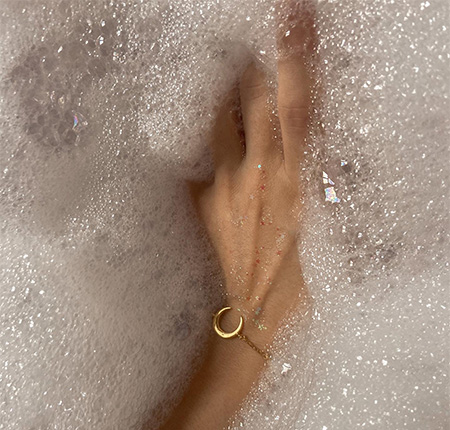
Genital itching from various skin conditions
Eczema, Psoriasis are conditions that can cause redness and itching in the vulva, in the long term. The unpleasant sensation may worsen during the night, due to dryness of the skin or perspiration.
These conditions can be caused by emotional stress, unsuitable daily absorbents, toilet paper, deodorants or an irritating soap used in the intimate area.
Other sexually transmitted diseases that cause itching
Other sexually transmitted diseases that can cause itching in the intimate area are Chlamydia and Gonorrhea. These diseases can be transmitted easily, because they often have no symptoms. However, it is good to know that signs of infection include: itching of the vulva and inside the vagina, abnormal and foul-smelling discharge, bleeding between periods, pain when urinating or defecating.
Because it's a topic that requires a lot of attention, we have an entire article on STDs that covers everything you need to know, right here.
Vaginal itching from vulvar or vaginal cancer
In very rare cases, itching in the intimate area in women can be signs of vulvar or vaginal cancer. For this reason, it is recommended that any discomfort occurring in the intimate area be discussed with the doctor, who will make a diagnosis and offer the right treatment solution.
What causes can generate itching in the external genital area
The causes of itching in the external genital area, of the vulva, are basically the same as vaginal itching. It could be irritation from detergents, synthetic fibers, or other toxic substances in intimate care products, or it could be a more serious problem.
Bacterial vaginosis, candidiasis, sexually transmitted infections such as chlamydia, gonorrhea or trichomoniasis, fungal infections and skin conditions such as psoriasis or eczema are the most common causes. Another possible cause is pubic pediculosis, i.e. pubic lice infestation, which causes severe itching that intensifies at night.
Often, vaginal itching will improve within a short period of time. However, there are certain body signals that inevitably force us to go to a medical consultation. So, pay attention if the itching in the intimate area is accompanied by other symptoms such as:
pain or burning during sex or urination
pain in the genital area or pelvic region
genital redness or inflammation
strange blisters or pears on the vulva
unusual vaginal discharge (green, yellow, or gray in color)
discharge that looks frothy or has a cottage cheese-like texture with a foul smell
When should you go to the doctor?
Depending on the symptoms and the specialist's findings, the patient may be recommended for further evaluation to determine the appropriate treatment.

Diagnosis for genital itching -
What to expect when you go to the doctor?
The doctor will ask you about the symptoms you are experiencing, their severity and their duration. You may also be asked about your sexual activity to clearly establish the causes of vaginal itching.
A gynecological examination will most likely be required and a sample of skin tissue from the vulva or a sample of vaginal discharge may be taken for analysis. Depending on the situation, the doctor may also recommend blood or urine tests.
Treatment for itching in the intimate area
Once the doctor understands the cause of your vaginal itching, he will recommend the right form of treatment. Some of the more common ones are below.
Ointment / Cream for vaginal itching
Vaginal itching cream is a recommended treatment to protect the external intimate area from itching, mild pain, redness or burning, which can occur due to a vaginal infection, after prolonged tampon use or in case of vaginal dryness.
Other skin conditions, such as eczema, dry skin or contact dermatitis in the intimate area, can also be cured by applying ointments locally, but also with the help of medicinal treatments.
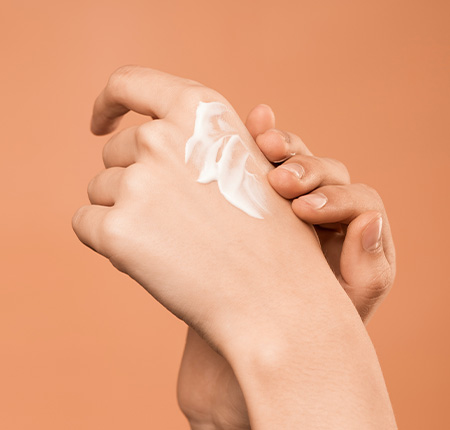
Eggs for itching in the intimate area
In the case of fungal infections (such as Candida), the use of antifungal drug treatment is indicated most of the time, either in the form of eggs in the case of women, or through a drug administered orally, in a single dose. They quickly remove the itching and the rest of the symptoms.
Drug treatment for vaginal itching
Many times, the doctor will prescribe drug treatment for vaginal itching. In cases such as eczema, dry skin or contact dermatitis in the intimate area, it is cured by applying ointments locally and with the help of medicinal treatments.
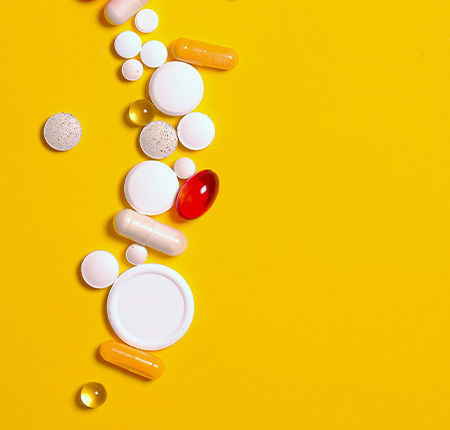
Treatment for itchy outer lips
If the itching affects the outer labia, the doctor can prescribe ointments for itching in the intimate area that are used to treat dermatological inflammations. You will only need to apply them externally, making sure they don't get inside the vagina.
You can temporarily relieve symptoms by using creams for itching in the intimate area based on corticosteroids (eg hydrocortisone). In case of intense itching, you may also be prescribed oral antihistamines. Antifungal creams and prebiotics are also used to relieve itching of the outer labia.
Treatment at home for itching in the intimate area
In addition to the doctor's recommendations, to relieve itching in the intimate area, you can try some of the home remedies that have been proven to be effective. Our recommendation is to also ask your doctor before trying them.
Here's what you can do to relieve itching in the intimate area:
an oatmeal or baking soda bath before bed
hold a towel with ice cubes on the vulva for a short time
use an anti-itch cream bought from the pharmacy
apply Greek yogurt on the intimate area
eat foods containing probiotics (yoghurt, kombucha, kimchi, sauerkraut, miso)
wear only cotton underwear
wash the vagina only with water, without perfumed soaps

Itching in the intimate area in men
Intimate itching can also occur in men, but it manifests itself slightly differently. The discomfort is intermittent or constant and usually occurs around the penis. Itching can be accompanied by other symptoms. We recommend a visit to the doctor to determine the causes and the appropriate treatment.
Food in the intimate area in children
Vaginal itching can also occur in children, and causes include:
Vaginitis - due to incorrect wiping of the intimate area
Inflammation - caused by chemicals in bath products
Sexual abuse
Regardless of the situation, we recommend that you go to the doctor to properly treat the causes of vaginal itching.
Prevention for itching in the intimate area
There are a few ways you can protect yourself from infections and other problems that lead to vaginal itching. Here are our suggestions:
Avoid scented toilet paper, intimate deodorants, powders and vaginal douches.
For intimate hygiene, use soaps and gels specially indicated for that area. It is important to wash once - twice a day, no more, so as not to cause dryness.
After going to the toilet, wipe from front to back.
Wear cotton underwear and change it every day. At night, sleep in a pair of cotton shorts or long pants with no underwear.
During menstruation, use external absorbents instead of vaginal tampons.
If you suffer from vaginal dryness, use water-based lubricants before intercourse.
Avoid unprotected sex, especially if you have multiple partners, to lower your risk of sexually transmitted diseases.
Avoid clothes that retain heat and moisture: nylon underwear, too tight jeans can cause, for example, candida.
Change wet or damp clothes immediately after swimming or exercising.
Change baby girls' diapers regularly.
Monitor your health constantly and perform gynecological and urological checks at regular intervals.
When you're itching, don't scratch because you can irritate the intimate area.
Always choose to take care of yourself and consult a doctor who can guide you to the right treatment for you.
Frequently asked questions about vaginal itching:
Questions like "What are the most effective home treatments?" or "How do I treat itching in the private area at home?" most frequently seek their answers. It is important to keep in mind, however, that the best treatment at home is not self-medication (which can make everything worse), but proper intimate hygiene accompanied by the treatment prescribed by the doctor.
But we know, when the symptoms are so unpleasant it's normal to wonder what you can do to get rid of them as quickly as possible. Below we have answered the most frequently asked questions related to the treatment of itching in the intimate area.
What to wash your intimate area with if you suffer from genital itching?
You only need water and a natural intimate gel to clean the vulva, outside - not inside - the vagina. Use Enroush intimate gel daily that contains 95% natural ingredients and is pH neutral to protect your intimate flora.
Avoid soaps, shower gels, and deodorants with perfumes or other suffocating chemicals, as they can make itching worse. For days when you need a quick refresher, you can use Enroush's hypoallergenic intimate wipes, infused with chamomile and prebiotics for gentle, non-irritating cleansing.
What can itching and stinging in the intimate area indicate?
Itching accompanied by stinging in the intimate area, especially when urinating or during sexual intercourse, can signal a urinary infection. But equally common causes are infection with Chlamydia or Neisseria Gonorrhoeae, sexually transmitted infections that can be easily treated with antibiotics and ova for itching in the genital area.
What can itching in the intimate area accompanied by cracked skin indicate?
Vulvar dermatitis caused by eczema, moisture, allergies or heat manifests as itchy and cracked, red and sometimes painful skin. After the examination, the doctor can do a skin test to determine the exact cause and prescribe a treatment in the form of creams or ointments to relieve your symptoms.
What can itching in the intimate area accompanied by redness indicate?
Itching in the groin area and reddened skin can indicate a fungal infection, a sexually transmitted disease like trichomoniasis, or even skin conditions like eczema and psoriasis. A visit to the doctor's office and performing skin or vaginal discharge tests will allow the doctor to identify the cause and, depending on it, prescribe you the best ointment for itching in the intimate area.
Can itching in the intimate area indicate an allergy?
Yes! Especially if there are no other symptoms (unusual discharge, fever, pelvic pain, or pain during intercourse or urination), the source of the itching may be an allergy.
A lot of irritating substances like perfume, bleaches, detergents or synthetic fibers can be found in soaps, shower gels, intimate deodorants, bubble baths, toilet paper, and even in menstrual products and underwear. Read the label and choose organic products, made from ingredients as natural as possible and without allergens.
What does it mean if I have genital itching and discharge?
Genital itching accompanied by unusual colored or foul smelling vaginal discharge may indicate an infection. In turn, the infection can be bacterial, fungal or sexually transmitted. Go to the gynecologist to find out the cause so that you can get the right treatment. After the diagnosis, the doctor can recommend the best treatment for itching in the intimate area.






















